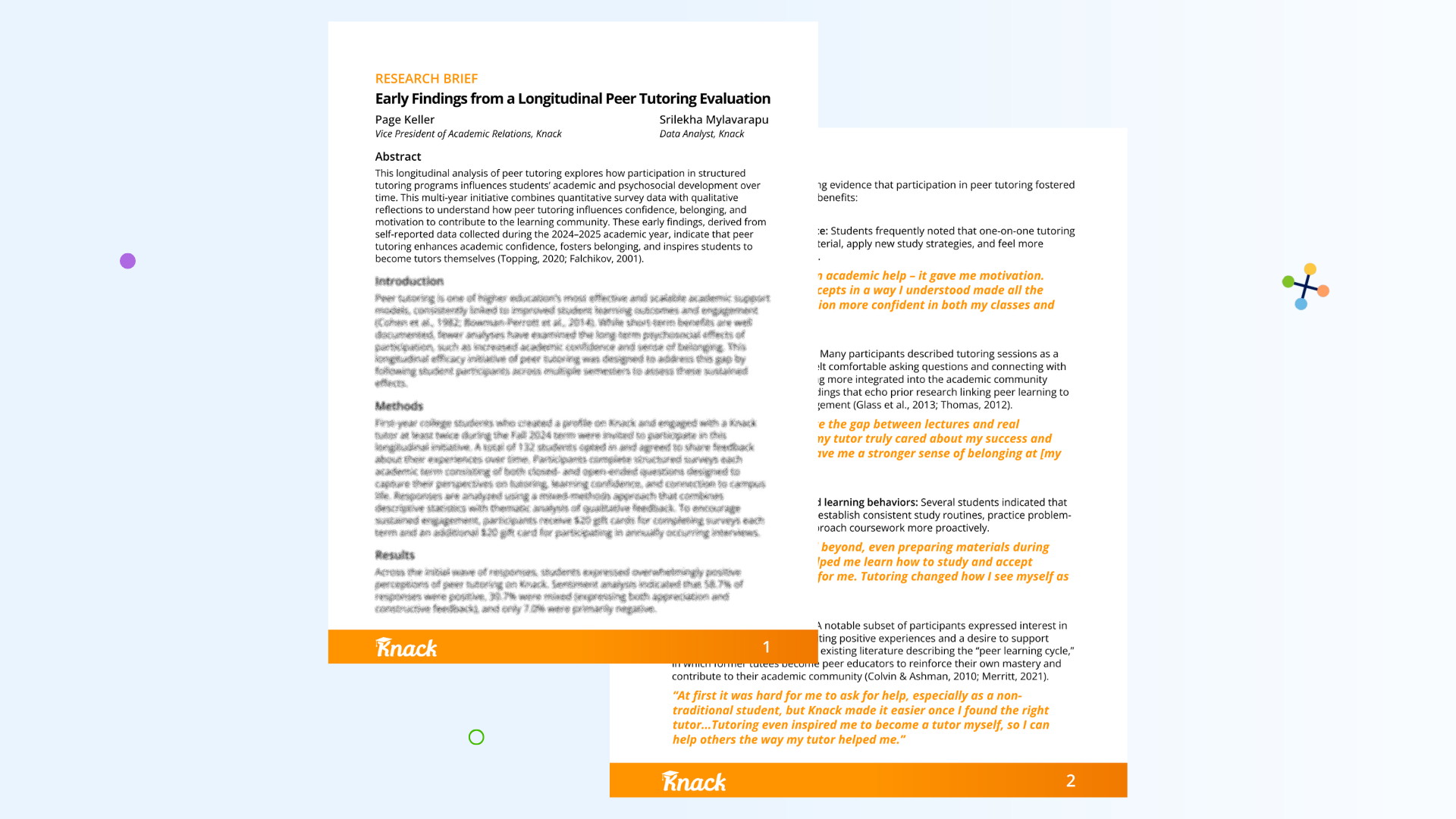4 min read
Early Insights from Knack’s Longitudinal Study: How Peer Tutoring Supports Confidence, Belonging, and Persistence
By: Knack on Nov 21, 2025 2:39:36 PM

Higher education leaders know that peer tutoring can improve immediate academic outcomes. What is less understood is how tutoring influences students over time. Does it strengthen confidence? Improve semester-to-semester persistence? Shape a student’s long-term development as a learner and community member?
To answer these questions, Knack launched a multi-year longitudinal study designed to measure the sustained academic and psychosocial impact of peer tutoring. This initiative follows students across multiple years to understand not just what tutoring helps them achieve today, but how it shapes their educational journey over time.
Our first research brief is complete, and the early trends reveal a powerful story about the long-term value of peer learning.
About the Longitudinal Study
The Longitudinal Efficacy Study of Peer Tutoring is a three to five year initiative that examines how peer tutoring influences both academic performance and student development across multiple semesters.
The study focuses on four primary goals:
- Measure academic outcomes.
Evaluate how tutoring affects course performance, grade improvements, and mastery of challenging material. - Understand persistence and progression.
Track semester-to-semester retention and progress toward graduation. - Explore the “peer learning cycle.”
Observe whether tutees later become tutors, and whether this shift influences their academic or psychosocial growth. - Inform institutions.
Provide evidence-based recommendations to help colleges strengthen, scale, and modernize peer learning on their campuses.
To support these goals, the study combines quantitative usage and outcome data with qualitative insights from student reflections, surveys, and interviews.
Who Is Participating
The first cohort includes 132 first-year students who used Knack tutoring at least twice during the Fall 2024 term and opted into ongoing participation. Each term, these students complete surveys and share open-ended reflections about their tutoring experiences, learning habits, and sense of connection to their campus.
Participants also receive incentives to encourage continued engagement throughout the study window. This approach helps reduce attrition and ensures that the research captures multi-semester developmental patterns rather than isolated moments.
What We Are Learning So Far
Although the study is just beginning, the early findings point to strong academic and psychosocial benefits.
- Students report increased academic confidence
Students consistently described tutoring as a turning point in their understanding of difficult material. Many shared that one-on-one support helped them adopt new study strategies, break down complex concepts, and feel more capable in courses that previously felt overwhelming.
This confidence often carried beyond a single tutoring session and influenced how they approached future assignments and exams. - Tutoring strengthens belonging and connection
Many students described tutoring sessions as welcoming, supportive spaces where they felt comfortable asking questions and making mistakes. These interactions helped students feel more connected to their peers and more integrated within the campus community.
This trend aligns with national research showing that belonging is a key predictor of persistence in higher education. - Students are building self-regulated learning habits
Participants noted improvements in behaviors that support long-term academic success, including consistent study routines, proactive engagement with course material, and more reflective problem-solving.
These habits contribute to stronger academic resilience and help students stay on track throughout the term. - Many students are inspired to become tutors
A significant number of tutees expressed interest in becoming tutors themselves. Their positive experiences increased their motivation to help others and contribute to the academic community.
This creates a reinforcing cycle in which students move from receiving support to providing it, which not only strengthens the tutoring ecosystem but also enhances their own learning and leadership skills.
Why These Findings Matter for Higher Education
Academic support services are often designed around short-term needs, such as preparing for an exam or supporting students through a challenging course. While these immediate goals are important, the early results from this study highlight the broader developmental value of peer tutoring.
Peer tutoring does more than close learning gaps. It builds confidence, strengthens community, and supports long-term persistence.
These early insights also help institutions understand how managed peer tutoring programs can scale support, reach students who might otherwise go unserved, and foster environments where students develop both academically and socially.
As the study continues, future phases will explore how these early effects evolve across multiple semesters and how participation in tutoring influences long-term academic trajectories, graduation pathways, and student identity development.
What Comes Next
Knack will continue gathering qualitative and quantitative data across the next several academic years. Additional insights will include:
- Longitudinal changes in confidence, belonging, and motivation
- Trends in persistence and course progression
- Differences between occasional and frequent tutoring users
- Outcomes for students who later become tutors
- Themes from annual interviews and cohort reflections
Each year, Knack will release updated findings and collaborate with institutional partners to co-author research outputs for broader dissemination.
Conclusion
The early findings from Knack’s longitudinal study highlight the transformative potential of peer tutoring. Students are not only improving academically, but also developing confidence, connection, and self-regulated learning habits that support long-term success.
This research underscores what many student success leaders already believe. When students support one another, they deepen understanding, build community, and create a stronger foundation for persistence and graduation.
The full research brief is available here for campuses interested in exploring these emerging insights in more detail.
Related Posts
Scaling Peer Tutoring at the University of New Hampshire: A Partnership with Knack
The University of New Hampshire (UNH) has long been committed to fostering student success through innovative academic support initiatives. A...
2025 Knack Partner Awards: Honoring Peer Tutoring Excellence at Northeastern and New College of Florida
The Knack Partner Awards celebrate campuses that go above and beyond to expand access, scale impact, and empower students through peer tutoring. In...
How Peer Tutoring Fosters Student Belonging
Peer tutoring has long been recognized as a valuable tool for academic success, but its benefits extend far beyond the classroom. One of the most...